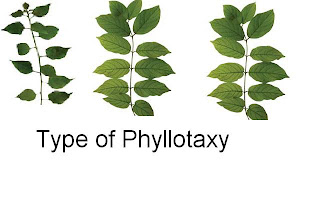Phyllotaxy is the pattern of arrangement of
leaves on the stem or branch. This is usually
of three types – alternate, opposite and
whorled . In alternate type of
phyllotaxy, a single leaf arises at each node
in alternate manner, as in china rose,
mustard and sun flower plants. In opposite
type, a pair of leaves arise at each node and
lie opposite to each other as in Calotropis
and guava plants. If more than two leaves
arise at a node and form a whorl, it is called
whorled, as in Alstonia.

Comments
Post a Comment